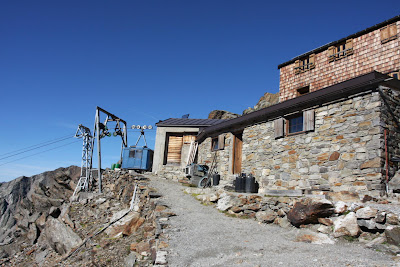Tuesday, September 30, 2008
What makes me sad
Last Sunday, the most high profile female police officer, Malalai Kahar, stationed in Kandahar, has been shot dead by unknown gunmen, on her way to work. Ironically, Malalai was the head of Kandahars department of crimes against women. Her son, who was with her in the car, was wounded as well but survived.
Not much later, a spokesman for an extremist Taliban movement, which targets government officials, claimed responsibility: "We killed Malalai, she was our target and we successfully eliminated our target".
Kandahar is the birthplace of extremist Taliban; during the years Taliban were in power, women in Kandahar were stopped from working outside their homes, and were only allowed onto the street with Burka and male accompanist.
Malalai was the first women to enrol in the Kandahar police force after the fall of the Taliban. To me, seeing persons like her, is a sign of hope in a country where men have been brainwashed of women rights and women continue to be discriminated in almost every sphere of life. Learning about her dead, and knowing that this wasn't the first assassination of brave women like her, simply for the work they are doing, and for the change which they symbolize, brought tears into my eyes.
Friday, September 26, 2008
Realities of life in Afghanistan
Few days ago I was I talked to my driver about education, on our way home from office. In his village, he mentioned, it is impossible to send girls to school; Taliban are policing at night from house to house, intimidating residents that sending girls to school will have dire consequences for the entire family. Abdul Haq, has several daughters, who have gone to school during their exile in Pakistan. Back in Afghanistan, they cannot continue with their education, despite the fact that overall, the education system has grown from 1 million kids in school back in 2001 to 6 million kids in school today. The Afghan reality, it seems, is two steps in front and one and a half steps back.
Few days after I had talked to him about this, I came across this article that gives details over the status of education in Afghanistan; which is best described as a success with many sacrifices.
Attacks deprive 300,000 students of education KANDAHAR, 22 September 2008 (IRIN) -
Zulaikha, 14, was the top student in her class last year but has been unable to attend school this year because of increased attacks on schools, rampant insecurity and threats to students and their families. "I wanted to become a doctor and treat poor and ill people," she told IRIN at her home in the outskirts of Kandahar city in southern Afghanistan. Taliban insurgents oppose female education and work and have frequently torched schools, killed school employees and circulated letters warning parents not to send their children, particularly girls, to school. "We don't object to our daughter's education but we also don't want her to be killed on the way to school or her family members killed because of her going to school," said Zulaikha's father, Abdul Rahman. Afghanistan has made impressive progress in primary and secondary education since the downfall of the Taliban regime in late 2001. At least 3,500 schools have been built since 2002 and hundreds more are planned. More than six million students, about 30 percent girls, are enrolled in 11,000 schools across the country, compared with about one million boys only in 2000, according to the Ministry of Education (MoE). However, resurgent Taliban and worsening security have put the country's hard-won educational achievements at serious risk. Education denied More than 600 primary, secondary and high schools are closed, mostly in the volatile southern provinces, because of prevalent insecurity and attacks on formal education, the MoE said. "In 45 districts of 12 provinces about 610-620 schools have been closed," Hamid Elmi, a spokesman for the MoE, told IRIN, adding that efforts were under way to re-open some schools through community support. Most of the closures are in the four southern provinces of Helmand, Kandahar, Zabul and Urozgan, where the conflict is having a greater effect than elsewhere. "Up to 80 percent of schools are closed in these four provinces," Elmi said. In the worst-affected Helmand Province, only 54 schools, primarily for boys, are functioning, against 223 schools that were open in 2002, according to MoE statistics. Consequently, more than 300,000 students have been deprived of an education in 12 provinces, according to MoE officials. Punishments The MoE said 99 schools have been attacked, torched and/or destroyed by armed assailants this year and 117 similar cases were reported in 2007. Dozens of students, some as young as seven, and teachers have been killed or injured by armed assailants over the past two years. Armed men associated with Taliban insurgents reportedly cut off the ears of a teacher in Zabul Province on 14 September as a sign of punishment to those who support education. In addition, Taliban insurgents in August reportedly attacked trucks carrying textbooks from Kabul to Kandahar province and burnt tens of thousands of books, the MoE said. Taliban denial A purported Taliban spokesman, Qari Yosuf Ahmadi, denied the insurgents' involvement in attacks on schools and students. "Our Mujahideen have not attacked schools and schoolchildren," Ahmadi told IRIN via telephone from an unidentified location. "Criminals - whom the government cannot stop - are carrying out such attacks," he said. The Taliban imposed a strict ban on females' education and employment and enforced an Islamic curriculum for boys during their reign (1996-2001). IRIN last year received a warning letter ostensibly issued by the Taliban [http://www.irinnews.org/Report.aspx?ReportId=74690] in which attacks on schools and students were supported. The government blamed the Taliban for attacks on educational facilities and school employees. "The Taliban are attacking everything related to education because they need illiterate youths to join their ranks," Elmi of the MoE said. Back to Top
Normality
But while I attempt to read, there is only one real thought in my mind. That this is one of the few moments when life in Afghanistan feels normal.
Friday, September 19, 2008
Saturday, September 13, 2008
Splash
Similaun Trekking
Thursday, September 11, 2008
New York Impressions
Friday, September 5, 2008
interview
on and on
Since I haven't much access to internet currently, I will not be able to add much words and pictures on my blog, until I get back to Kabul by the end of next week. so, don't bother looking for updates every day :) But I promise, by the 14th, you will have plenty of new pics and stuff to look at























 Similaun Glacier. How must it feel to be buried under these ice shields for thousands of years???
Similaun Glacier. How must it feel to be buried under these ice shields for thousands of years???





















